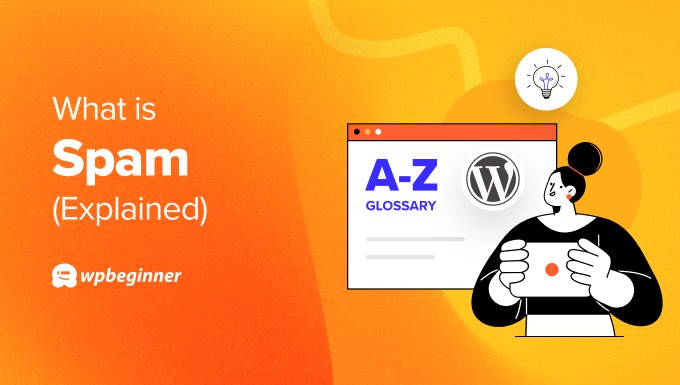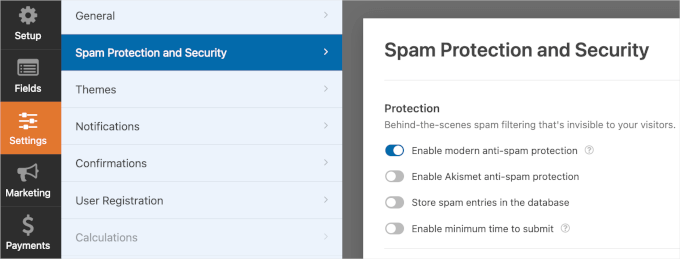Spam is content you don’t want and didn’t ask for, often advertising products you are not interested in or linking to websites that may contain malware. And there is always too much of it.
Most people are familiar with spam messages in their email inboxes. As a WordPress website owner, spammers now have more ways to annoy you. They can leave spam comments, submit spam messages through your forms, create spam registrations of fake user accounts, and more.
Dealing with spam wastes valuable time that you could have spent working on your business. Worse, if the spam is visible on your website, then it is also bad for the user experience and SEO.
Luckily, there are effective tools, plugins, and strategies you can use to combat spam.

Combating Comment Spam
Comment spam is a problem for many website owners, and the worst thing is that it is visible to your website visitors.
These comments are usually submitted by automated bots and scripts and often contain links to other websites to boost their SEO, spread malware, or trick your unsuspecting visitors into sharing personal information.
Your first line of defense is comment moderation, where only comments you approve are shown on your website’s front end. If you like, comments from previously approved authors can be automatically approved in the future to save you time.

You can also use Google reCAPTCHA to block most spam scripts and bots.
This will require commenters to click a checkbox to prove they are human. If their mouse movements look suspicious, they may be given another test in which they need to click matching objects in a set of images.

Another strategy is to remove the ‘Website’ field from the comment form so that commenters don’t get the value of the backlink. This will usually result in less spam because you have taken away the reward spammers are looking for.
You can also stop spammers from accessing your website using security software like Sucuri. Once enabled, any suspicious requests will be blocked before they reach your website.
For more ideas, see our list of vital tips and tools to combat comment spam in WordPress.
Blocking Form Spam
Spammers will also target your online forms, such as contact forms and newsletter signup forms. That’s because spambots also look for non-secure forms so they can email you ad links or send you to phishing sites.
Your first step is to choose the right plugin. Some of the best WordPress form plugins, like WPForms, have built-in antispam protection that verifies each submission using a token.

WPForms also includes a keyword filter that lets you automatically block submissions that contain spammy keywords like ‘make money fast’.
Like comment spam, you can also add reCAPTCHA to your forms to block spam bots and scripts or block the IP addresses of repeat offenders. Or you can hide your forms from bots by password-protecting them or only showing them to registered users.
For a complete list of methods, see our guide on how to block contact form spam in WordPress.
Stopping Spam Registrations
If your website allows user registration, then you may be noticing a lot of spam registrations. These are often hackers looking for an easy way to gain access to your website.
You can use many of the same strategies to stop spam registrations. For example, you can moderate new user registrations, add a reCAPTCHA field, and block certain users or geographical areas manually or by using a security plugin.
For detailed instructions, see our guide on how to stop spam registrations on your WordPress membership site.
Preventing Other Types of Spam in WordPress
Here are a couple of guides on preventing other types of spam in WordPress:
- How to Block WordPress Referrer Spam in Google Analytics
- How to Prevent Fraud and Fake Orders in WooCommerce
- What, Why, and How-To’s of Trackbacks and Pingbacks in WordPress
We hope this article helped you learn more about spam in WordPress. You may also want to see our Additional Reading list below for related articles on useful WordPress tips, tricks, and ideas.
If you liked this article, then please subscribe to our YouTube Channel for WordPress video tutorials. You can also find us on Twitter and Facebook.
Additional Reading
- How to Reduce WordPress Comment Spam with Cookies for Comments
- How to Quickly Batch Delete Spam Comments in WordPress
- 12+ Vital Tips and Tools to Combat Comment Spam in WordPress
- How to Easily Add reCAPTCHA to WordPress Comment Form
- How to Prevent Fraud and Fake Orders in WooCommerce
- How to Block WordPress Referrer Spam in Google Analytics
- How to Stop Spam Registrations on your WordPress Membership Site
- How to Change Akismet’s Delete Spam Schedule in WordPress
- What Is Akismet and Why You Should Start Using it Right Away
- Beginner’s Guide on How to Moderate Comments in WordPress




